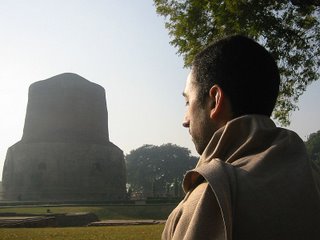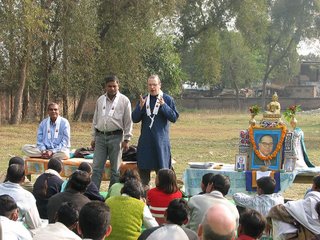Plans afoot at Sarnath, India
Vishvapani has recently returned from a pilgrimage to the Holy Places of the Buddha, part of his research for writing a full-length biography of the Buddha. He reports -
 "Each of the pilgrimage places associated with the life of the Buddha has its own atmosphere. Bodh Gaya, where the Buddha gained enlightenment, is a vibrant focus for practice and devotion for Buddhists from around the world; Vultures Peak, the site of many important discourses, remains a remote and beautiful spot; and Sarnath, where he first shared his teaching, has an atmosphere of quiet concentration. Several ancient stupas mark the spots where his former disciples first saw him approaching; where he gave his first discourse; and where he later taught others who had come from the nearby Hindu holy city of Varanasi.
"Each of the pilgrimage places associated with the life of the Buddha has its own atmosphere. Bodh Gaya, where the Buddha gained enlightenment, is a vibrant focus for practice and devotion for Buddhists from around the world; Vultures Peak, the site of many important discourses, remains a remote and beautiful spot; and Sarnath, where he first shared his teaching, has an atmosphere of quiet concentration. Several ancient stupas mark the spots where his former disciples first saw him approaching; where he gave his first discourse; and where he later taught others who had come from the nearby Hindu holy city of Varanasi.
"Across the road from the main site and set back a little is land belonging to the FWBO/TBMSG. To date, only a small building has been erected on here, but it hasn’t been unused and plans are afoot to create an international study centre. There’s another, separately administered, plot of land in Bodh Gaya".
 As well as conducting research for his book, Vishvapani was in Sarnath to support his friend Manidhamma, recently returned to India after six years in UK, and about to begin establishing an international study centre at Sarnath. While there Vishvapani gave a talk on the land on ‘The Unity of Buddhism’, which was attended by around fifty people, mostly local Dalit followers of Dr Ambedkar, tens of thousands of whom became Buddhists in the 1960s. Sadly however, they have seen little follow-up in the following years, despite the presence of many Buddhist teachers in Sarnath. Two years ago Dhammachari Shantighosha moved from Pune (in the TBMSG heartland, many hundreds of miles to the south) to look after the land and work with local Buddhists. The people attending Vishvapani’s talk had gathered as a result of Shantighosha’s work, and over the next three days Vishvapani and Kamalagita led a retreat for ten local dhamma-mitras.
As well as conducting research for his book, Vishvapani was in Sarnath to support his friend Manidhamma, recently returned to India after six years in UK, and about to begin establishing an international study centre at Sarnath. While there Vishvapani gave a talk on the land on ‘The Unity of Buddhism’, which was attended by around fifty people, mostly local Dalit followers of Dr Ambedkar, tens of thousands of whom became Buddhists in the 1960s. Sadly however, they have seen little follow-up in the following years, despite the presence of many Buddhist teachers in Sarnath. Two years ago Dhammachari Shantighosha moved from Pune (in the TBMSG heartland, many hundreds of miles to the south) to look after the land and work with local Buddhists. The people attending Vishvapani’s talk had gathered as a result of Shantighosha’s work, and over the next three days Vishvapani and Kamalagita led a retreat for ten local dhamma-mitras.
Vishvapani's report continues: "I was very impressed by their appreciation of Shantighosha and by their enthusiasm for the Dhamma. Asit, one of the mitras on the retreat, collects scrap metal, and whenever he visits a locality he gathers people around and he tells them whatever he has just learned about Dr Ambedkar and Buddhism."
Manidhamma will be working with the Dhammaloka Trust, which intends to develop the Sarnath site into an international study centre. Their ambitious plans include a pilgrim’s guest house, a shrine room, library and study centre that will host courses and retreats for people visiting from around the world. He also hopes to develop contacts between Sarnath’s cosmopolitan Buddhist community and the local Ambedkarite Buddhists.
The project has Sangharakshita’s blessing, but it will depend on donations from outside India. If you would like to learn more about the project or help support it - or if you have an interest in Buddhist pilgrimage - you can email Dhammaloka.
 "Each of the pilgrimage places associated with the life of the Buddha has its own atmosphere. Bodh Gaya, where the Buddha gained enlightenment, is a vibrant focus for practice and devotion for Buddhists from around the world; Vultures Peak, the site of many important discourses, remains a remote and beautiful spot; and Sarnath, where he first shared his teaching, has an atmosphere of quiet concentration. Several ancient stupas mark the spots where his former disciples first saw him approaching; where he gave his first discourse; and where he later taught others who had come from the nearby Hindu holy city of Varanasi.
"Each of the pilgrimage places associated with the life of the Buddha has its own atmosphere. Bodh Gaya, where the Buddha gained enlightenment, is a vibrant focus for practice and devotion for Buddhists from around the world; Vultures Peak, the site of many important discourses, remains a remote and beautiful spot; and Sarnath, where he first shared his teaching, has an atmosphere of quiet concentration. Several ancient stupas mark the spots where his former disciples first saw him approaching; where he gave his first discourse; and where he later taught others who had come from the nearby Hindu holy city of Varanasi."Across the road from the main site and set back a little is land belonging to the FWBO/TBMSG. To date, only a small building has been erected on here, but it hasn’t been unused and plans are afoot to create an international study centre. There’s another, separately administered, plot of land in Bodh Gaya".
 As well as conducting research for his book, Vishvapani was in Sarnath to support his friend Manidhamma, recently returned to India after six years in UK, and about to begin establishing an international study centre at Sarnath. While there Vishvapani gave a talk on the land on ‘The Unity of Buddhism’, which was attended by around fifty people, mostly local Dalit followers of Dr Ambedkar, tens of thousands of whom became Buddhists in the 1960s. Sadly however, they have seen little follow-up in the following years, despite the presence of many Buddhist teachers in Sarnath. Two years ago Dhammachari Shantighosha moved from Pune (in the TBMSG heartland, many hundreds of miles to the south) to look after the land and work with local Buddhists. The people attending Vishvapani’s talk had gathered as a result of Shantighosha’s work, and over the next three days Vishvapani and Kamalagita led a retreat for ten local dhamma-mitras.
As well as conducting research for his book, Vishvapani was in Sarnath to support his friend Manidhamma, recently returned to India after six years in UK, and about to begin establishing an international study centre at Sarnath. While there Vishvapani gave a talk on the land on ‘The Unity of Buddhism’, which was attended by around fifty people, mostly local Dalit followers of Dr Ambedkar, tens of thousands of whom became Buddhists in the 1960s. Sadly however, they have seen little follow-up in the following years, despite the presence of many Buddhist teachers in Sarnath. Two years ago Dhammachari Shantighosha moved from Pune (in the TBMSG heartland, many hundreds of miles to the south) to look after the land and work with local Buddhists. The people attending Vishvapani’s talk had gathered as a result of Shantighosha’s work, and over the next three days Vishvapani and Kamalagita led a retreat for ten local dhamma-mitras.Vishvapani's report continues: "I was very impressed by their appreciation of Shantighosha and by their enthusiasm for the Dhamma. Asit, one of the mitras on the retreat, collects scrap metal, and whenever he visits a locality he gathers people around and he tells them whatever he has just learned about Dr Ambedkar and Buddhism."
Manidhamma will be working with the Dhammaloka Trust, which intends to develop the Sarnath site into an international study centre. Their ambitious plans include a pilgrim’s guest house, a shrine room, library and study centre that will host courses and retreats for people visiting from around the world. He also hopes to develop contacts between Sarnath’s cosmopolitan Buddhist community and the local Ambedkarite Buddhists.
The project has Sangharakshita’s blessing, but it will depend on donations from outside India. If you would like to learn more about the project or help support it - or if you have an interest in Buddhist pilgrimage - you can email Dhammaloka.
Labels: Dharmaduta, India, retreat, Sarnath

 rss
rss
1 Comments:
In this day and age of the 'higher criticism', if you're writing a bio of the Buddha you can't possibly state as some sort of fact that Bodh Gaya was where the Buddha gained Enlightenment, Sarnath where he gave his first teachings etc. That doesn't mean there aren't some useful teachings flying around, but please! Unless of course the FWBO really is Protestant Buddhism, and believes in the literal truth of the Pali Canon?
I know Sangharakshita likes to put down academia, but your author could use a university degree.
Post a Comment
<< Home